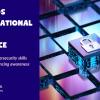ISO/IEC 27001 - The international standard for information security
ISO 27001 is an international standard that outlines the specifications for an Information Security Management System (ISMS). An ISMS is a structured approach involving people, processes, and technology to safeguard an organisation's information through risk management. It helps defend against external cyberattacks and internal threats like accidental breaches and human error.
Defining ISO 27001
ISO 27001 focuses on three crucial aspects of information: confidentiality, integrity, and availability. Confidentiality ensures information is only accessible to authorized parties, integrity ensures information is accurate and protected from corruption, and availability ensures information is accessible when needed.
This standard has seen a significant increase in certifications over the past decade and is designed to help organisations manage their security practices consistently and cost-effectively, regardless of their size or nature. It is part of the ISO 27000 series, which collectively provides a globally recognized framework for Information Security Management.
ISO 27001 benefits
ISO 27001 benefits include securing information in all forms, increasing resilience to cyberattacks, protecting against various threats, adapting to evolving security landscapes, cost-effectively managing risks, and ensuring the confidentiality, availability, and integrity of data. Additionally, it integrates security into everyday business practices:
- Protect your data, wherever it is: protecting information in digital, physical (hard copy), and cloud-based formats.
- Increase your attack resilience: enhance your organisation's resilience against cyberattacks, bolstering its ability to withstand and recover from such threats.
- Reduce information security costs: streamline information security expenses by implementing only the necessary security measures, enabling you to maximize the value of your budget
- Respond to evolving security threats: continuously adapting to changes in both the external environment and internal organisational dynamics.
- Improve company culture: integrating people, processes, and technology, ensuring that employees are well-informed about risks and incorporate security practices into their daily work routines.
- Meet contractual obligations: certification serves as tangible evidence of your organisation's dedication to safeguarding data, providing a valuable credential when vying for new business opportunities.
How to achieve ISO 27001 compliance
To achieve ISO 27001 certification, organisations must meet the standard's requirements and undergo a certification audit conducted by an external certification body. Certification is not mandatory, but it provides valuable external validation of an organisation's commitment to internationally accepted information security standards. If the audit is successful, the organisation is awarded a certificate.
Digital skills resource details
Certification





